-
 Bitcoin
Bitcoin $101,966.7461
-2.52% -
 Ethereum
Ethereum $3,249.1999
-2.35% -
 XRP
XRP $2.9873
-3.37% -
 Tether USDt
Tether USDt $0.9997
-0.04% -
 Solana
Solana $227.4140
-4.50% -
 BNB
BNB $670.8506
-1.67% -
 USDC
USDC $1.0000
-0.01% -
 Dogecoin
Dogecoin $0.3249
-1.74% -
 Cardano
Cardano $0.9299
-4.20% -
 TRON
TRON $0.2540
-0.15% -
 Chainlink
Chainlink $24.7274
-3.05% -
 Avalanche
Avalanche $33.8427
-3.39% -
 Stellar
Stellar $0.4085
-3.52% -
 Sui
Sui $3.9663
-5.70% -
 Toncoin
Toncoin $4.8366
-1.55% -
 Hedera
Hedera $0.3007
-4.85% -
 Shiba Inu
Shiba Inu $0.0...01881
-0.48% -
 Polkadot
Polkadot $6.3727
1.35% -
 Litecoin
Litecoin $124.4343
-5.30% -
 UNUS SED LEO
UNUS SED LEO $9.7726
-0.31% -
 Hyperliquid
Hyperliquid $26.4556
-3.57% -
 Bitcoin Cash
Bitcoin Cash $424.0048
-2.74% -
 Bitget Token
Bitget Token $6.8882
0.12% -
 Uniswap
Uniswap $11.3552
-5.42% -
 Ethena USDe
Ethena USDe $1.0010
-0.02% -
 Pepe
Pepe $0.0...01324
-1.23% -
 Dai
Dai $1.0000
-0.01% -
 NEAR Protocol
NEAR Protocol $4.4780
-5.01% -
 MANTRA
MANTRA $5.3213
-4.50% -
 Aave
Aave $313.4559
-3.36%
What is Ethereum smart contract
Ethereum smart contracts, autonomous and immutable programs stored on the blockchain, revolutionize trust, negotiation, and automation in various blockchain applications, from DeFi to supply chain management.
Nov 09, 2024 at 02:59 am
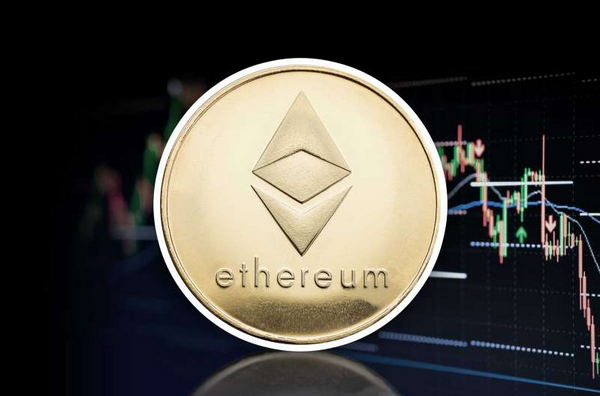
Ethereum Smart Contracts: A Comprehensive Guide
Ethereum smart contracts are self-executing programs stored on the Ethereum blockchain. They are autonomous, transparent, and immutable. Designed to reduce trust and simplify negotiations, smart contracts play a pivotal role in various blockchain applications.
Key Features of Ethereum Smart Contracts:
- Autonomous Execution: Smart contracts are autonomous programs that execute automatically when predefined conditions are met. This eliminates the need for manual intervention and reduces the risk of human error.
- Transparency: All smart contract code is open and auditable. This promotes trust and transparency among participants.
- Immutability: Once deployed on the blockchain, smart contracts cannot be altered or removed. This ensures the integrity and security of the contract's execution.
Working Mechanism of Ethereum Smart Contracts
- Contract Creation: A smart contract is designed and coded in Solidity, a programming language specifically developed for Ethereum. It then goes through a compilation process to convert Solidity code into EVM bytecode understandable by the Ethereum Virtual Machine (EVM).
- Deployment: The compiled contract is deployed onto the Ethereum network, and a unique address is generated for it. This address serves as the contract's public identifier on the blockchain.
- Initialization: The deployment transaction typically includes an initialization function that sets up initial contract parameters and states. This function is executed only once during the contract's lifetime.
- Transaction Execution: Parties interact with smart contracts by sending transactions to their addresses. These transactions trigger the execution of functions defined within the contract code.
- State Update: If the transaction meets the conditions specified in the contract code, the contract's state may be updated. The new state is recorded on the blockchain and becomes accessible to all participants.
Benefits of Using Ethereum Smart Contracts
- Automation: Smart contracts automate various processes, reducing the need for intermediaries and manual effort. This saves time, costs, and reduces the risk of errors.
- Transparency and Trust: The open and auditable nature of smart contracts builds trust among parties, since all actions are recorded on the blockchain and visible to all.
- Enhanced Security: Smart contracts operate on the secure Ethereum blockchain, leveraging its decentralized architecture and consensus mechanisms to ensure data integrity and prevent unauthorized modifications.
- Reduced Costs: By eliminating the need for intermediaries and simplifying business processes, smart contracts can significantly reduce transaction and operating expenses.
- New Application Possibilities: Smart contracts enable the creation of innovative applications that were previously impossible or impractical with traditional systems. This opens up new possibilities for business models and industry transformations.
Common Use Cases of Ethereum Smart Contracts
- Digital Agreements: Smart contracts can be used to create legally binding agreements, such as contracts for sale, insurance policies, or loan agreements. These contracts execute automatically based on pre-defined terms, reducing the need for complex legal documentation.
- Decentralized Finance (DeFi): Smart contracts are the foundation of DeFi, allowing for the creation of decentralized financial instruments and services, such as lending, borrowing, stablecoins, and decentralized exchanges.
- Supply Chain Management: Smart contracts can track the provenance and movement of goods through supply chains, ensuring transparency and accountability. They can also automate payments, streamline logistics, and reduce fraud.
- Voting and Elections: Smart contracts can facilitate secure and transparent voting systems, allowing for the casting and counting of votes on the blockchain. This reduces the risk of election fraud and eliminates the need for centralized authorities.
- Gaming and Entertainment: Smart contracts can be used in gaming applications to manage in-game assets, distribute rewards, and enforce game rules. In the entertainment industry, smart contracts can automate royalty payments and provide new ways for content creators to monetize their work.
Top Smart Contract Development Platforms (Excluding FTX)
- Ethereum: Ethereum is the leading platform for smart contract development, with a vast ecosystem of tools, resources, and an active community.
- Binance Smart Chain (BSC): BSC offers a high-throughput alternative to Ethereum, with faster transaction speeds and lower gas fees.
- Solana: Solana is a high-performance blockchain that supports smart contracts with unparalleled scalability and low transaction costs.
- Polygon: Polygon is a layer-2 scaling solution for Ethereum, providing faster transactions and lower gas fees, while maintaining interoperability with the Ethereum ecosystem.
- Avalanche: Avalanche is another high-throughput blockchain that offers fast and low-cost transactions for smart contract applications.
Considerations for Developing Smart Contracts
- Security: Smart contracts should be thoroughly audited and tested to ensure they are secure against vulnerabilities and exploits.
- Cost Optimization: Developers should optimize smart contract code to minimize gas consumption and reduce transaction fees.
- Maintenance and Upgrades: Smart contracts should be designed with future maintenance and upgrades in mind, as code changes on the blockchain can be complex and costly.
- Legal and Regulatory Compliance: It is essential to consider the legal and regulatory implications of smart contracts, particularly in jurisdictions where digital agreements may not yet have clear legal standing.
- User Experience: Smart contract user interfaces and interactions should be designed with user-friendliness and simplicity in mind, ensuring a seamless and accessible experience for all participants.
Disclaimer:info@kdj.com
The information provided is not trading advice. kdj.com does not assume any responsibility for any investments made based on the information provided in this article. Cryptocurrencies are highly volatile and it is highly recommended that you invest with caution after thorough research!
If you believe that the content used on this website infringes your copyright, please contact us immediately (info@kdj.com) and we will delete it promptly.
- Litecoin and Mantra Could Extend Gains, Technical Analysis Shows
- 2025-02-01 19:40:55
- Rollblock (RBLK) Presale: The GambleFi Revolution That's Stealing the Spotlight From Solana (SOL)
- 2025-02-01 19:40:55
- Remittix (RTX) Gains Traction as Dogecoin (DOGE) Investors Seek New Crypto Projects
- 2025-02-01 19:40:55
- FXGuys ($FXG): The New DeFi Contender Poised to Leave XRP and SUI in the Dust
- 2025-02-01 19:40:55
- Remittix (RTX) Promises to Challenge XRP as the Top Cross-Border Payment Crypto
- 2025-02-01 19:40:55
- Elluminex (ELX) Presale Attracts Growing Interest as Ripple (XRP) Maintains Bullish Momentum
- 2025-02-01 19:40:55
Related knowledge
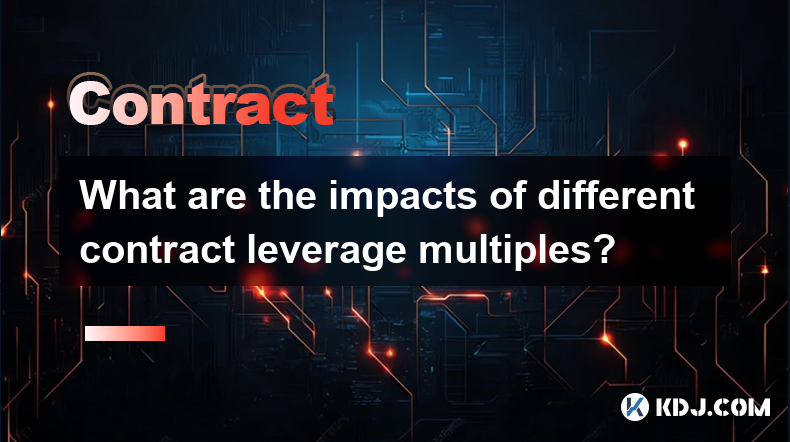
What are the impacts of different contract leverage multiples?
Dec 16,2024 at 12:46pm
Impacts of Different Contract Leverage MultiplesLeverage, a tool leveraged in the financial realm, amplifies trading activities and enhances potential returns while simultaneously magnifying risks. Understanding the implications of varying leverage multiples is paramount for savvy traders. This article delves into the impacts of different contract lever...

Which is more suitable for novices, contract trading or margin trading on Huobi.com?
Dec 16,2024 at 12:44pm
Which is More Suitable for Novices: Contract Trading or Margin Trading on Huobi.com?As a novice trader venturing into the world of cryptocurrency trading, the choice between contract trading and margin trading on Huobi.com can be a daunting one. Both instruments offer unique advantages and drawbacks, making it crucial to understand their key differences...
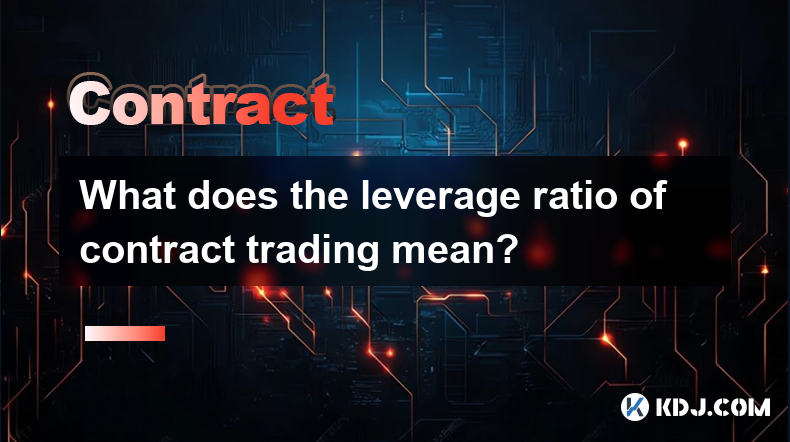
What does the leverage ratio of contract trading mean?
Dec 16,2024 at 12:43pm
What does the leverage ratio of contract trading mean?IntroductionLeverage ratio is a key concept in contract trading, allowing traders to gain exposure to a larger position than their initial capital would allow. This can potentially amplify both profits and losses, making it crucial for traders to understand its implications.Understanding Leverage Rat...

What scams exist in leveraged trading of virtual currency contracts?
Dec 16,2024 at 12:42pm
What Scams Exist in Leveraged Trading of Virtual Currency Contracts?Leveraged trading of virtual currency contracts, also known as margin trading, can be a lucrative way to increase your profits. However, it is important to be aware of the various scams that exist in this market so that you can protect yourself from losing your money.Pump-and-dump scams...
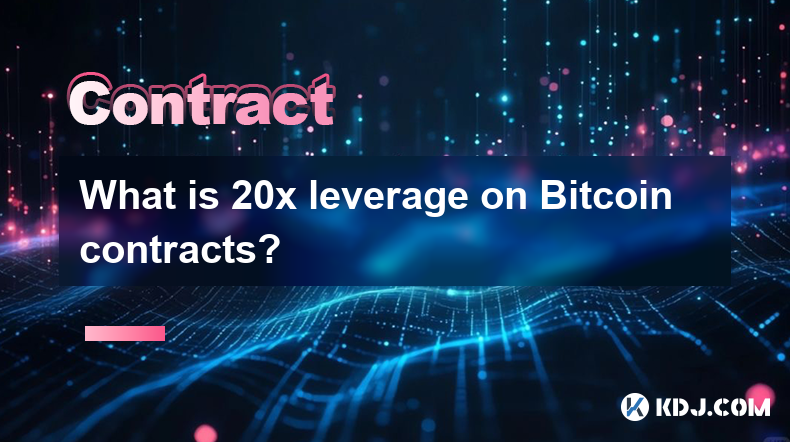
What is 20x leverage on Bitcoin contracts?
Dec 16,2024 at 12:40pm
What is 20x Leverage on Bitcoin Contracts?IntroductionLeverage is a powerful tool in the world of trading that can magnify both profits and losses. However, it's essential to understand the risks involved before using leverage, especially when trading volatile assets like Bitcoin. In this comprehensive guide, we will delve into the concept of 20x levera...
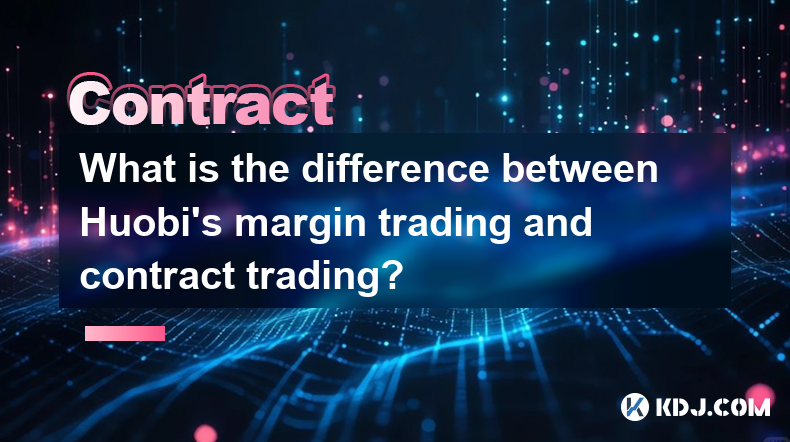
What is the difference between Huobi’s margin trading and contract trading?
Dec 16,2024 at 12:39pm
Understanding the Distinctions between Huobi Margin Trading and Contract TradingIntroductionHuobi, a leading cryptocurrency exchange, offers diverse trading options to cater to traders' varying risk tolerance and investment goals. Among these options are Margin Trading and Contract Trading, each with distinct features and trading mechanisms. This compre...

What are the impacts of different contract leverage multiples?
Dec 16,2024 at 12:46pm
Impacts of Different Contract Leverage MultiplesLeverage, a tool leveraged in the financial realm, amplifies trading activities and enhances potential returns while simultaneously magnifying risks. Understanding the implications of varying leverage multiples is paramount for savvy traders. This article delves into the impacts of different contract lever...

Which is more suitable for novices, contract trading or margin trading on Huobi.com?
Dec 16,2024 at 12:44pm
Which is More Suitable for Novices: Contract Trading or Margin Trading on Huobi.com?As a novice trader venturing into the world of cryptocurrency trading, the choice between contract trading and margin trading on Huobi.com can be a daunting one. Both instruments offer unique advantages and drawbacks, making it crucial to understand their key differences...

What does the leverage ratio of contract trading mean?
Dec 16,2024 at 12:43pm
What does the leverage ratio of contract trading mean?IntroductionLeverage ratio is a key concept in contract trading, allowing traders to gain exposure to a larger position than their initial capital would allow. This can potentially amplify both profits and losses, making it crucial for traders to understand its implications.Understanding Leverage Rat...

What scams exist in leveraged trading of virtual currency contracts?
Dec 16,2024 at 12:42pm
What Scams Exist in Leveraged Trading of Virtual Currency Contracts?Leveraged trading of virtual currency contracts, also known as margin trading, can be a lucrative way to increase your profits. However, it is important to be aware of the various scams that exist in this market so that you can protect yourself from losing your money.Pump-and-dump scams...

What is 20x leverage on Bitcoin contracts?
Dec 16,2024 at 12:40pm
What is 20x Leverage on Bitcoin Contracts?IntroductionLeverage is a powerful tool in the world of trading that can magnify both profits and losses. However, it's essential to understand the risks involved before using leverage, especially when trading volatile assets like Bitcoin. In this comprehensive guide, we will delve into the concept of 20x levera...

What is the difference between Huobi’s margin trading and contract trading?
Dec 16,2024 at 12:39pm
Understanding the Distinctions between Huobi Margin Trading and Contract TradingIntroductionHuobi, a leading cryptocurrency exchange, offers diverse trading options to cater to traders' varying risk tolerance and investment goals. Among these options are Margin Trading and Contract Trading, each with distinct features and trading mechanisms. This compre...
See all articles

























































































